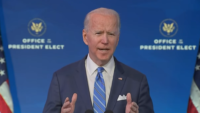For example, it would require Corps to complete feasibility studies within three years at a cost of no more than $3 million each and with concurrent action by three Corps management levels. In some circumstances, it would allow a fourth year for a study.
The Corps already has been implementing this so-called 3x3x3 approach, but Shuster’s bill would make it a statutory mandate.
But environmental organizations are worried about environmental-review provisions. In a letter sent to Shuster on Sept. 10—the day before he unveiled his bill—119 environmental groups urged him not to “undermine the environmental review and public input and participation process for federal water resources projects.”
Scott Slesinger, Natural Resources Defense Council legislative director and a signer of the letter, said in a statement that blaming environmental reviews for the long delays on Corps projects “is like a football team blaming their loss on the referees when the real problem is they can’t run, they can’t pass, and they can’t defend.”
Slesinger added that a Corps federal funding shortfall is the main reason for project delay.
Shuster says he disagrees with the environmentalists’ position and contends there is “a lot of evidence” that environmental reviews slow down project approvals.
Story updated on Sept. 13 to include National Waterways Conference comments.


